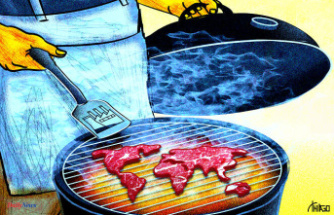While the chirping of crickets makes every mild summer night even more beautiful, everyone can probably do without the annoying buzzing of mosquitoes. There are a number of ways to combat mosquitoes and their bites. An overview.
A subtle buzzing, bites that often go unnoticed overnight and then the itching: mosquitoes can be really annoying. Species from tropical areas also pose a health risk as they can be carriers of diseases.
So it's best not to let the insects have their way in the first place. But there are also good means of relief if the little bloodsuckers have stung you. Tips and Tricks.
Mosquito repellents, which can be bought in pharmacies, drugstores and supermarkets, offer a certain degree of protection. But the most effective preparations, which are supposed to work for up to 7.5 hours, have a disadvantage: they usually contain DEET (diethyltoluamide), which is the best way to keep mosquitoes away, but according to the Hamburg Consumer Center it poses health risks.
The active ingredient Icaridin is better tolerated, but still provides good protection. The active ingredient para-menthane-3,8-diol (PMD) also performed well in product tests conducted by Stiftung Warentest. Less good: Defense substances based on essential oils from lavender or lemongrass. According to consumer protection, they evaporate quickly on the skin and can irritate the mucous membranes when exposed to sunlight.
In order not to impair the effect of the agents, they should not be applied directly together with sunscreen preparations, but 20 minutes later, advises the State Pharmacy Chamber of Hesse.
Because of possible side effects, the consumer advice center only recommends mosquito repellents if this is absolutely necessary, for example when hiking outdoors. The Federal Environment Agency (UBA) also advises light-colored, loose-fitting clothing, which deters insects and makes it difficult for them to get to the skin.
The Hamburg consumer advocates recommend further mechanical protection: mosquito nets over beds and prams, fine-mesh fly screens on windows and doors. Travelers can take gauze in their luggage and cut it on the spot, tape it to windows and openings.
But all too often the bloodthirsty insects make their way and sting. Itching is the result, relief is required. "If the mosquito bites you, cooling the bite with a damp, cold cloth, a slice of lemon or half an onion will help," says Tristan Jorde, an environmental advisor at the Hamburg consumer advice center. Another household remedy according to "Apotheken Umschau" (issue B06/21): envelopes with acetic alumina.
Antihistamines, i.e. remedies for allergy-related symptoms, also help. It is available for application to the skin or in tablet form. Non-prescription creams, lotions and gels with the active ingredient hydrocortisone also relieve mild inflammation, according to the Federal Association of the Pharmaceutical Industry (BPI). Such preparations should be used "only for a few days, but not longer than two weeks" without medical advice.
So-called thermal stitch healers are mostly harmless, but they should only be used on intact skin. They promise greater success the quicker the sting is treated.
According to the BPI, the electronic heat pens with a short heat impulse of around 50 degrees Celsius prevent the body from releasing the itch-promoting protein histamine, which people use to react to stings. Accordingly, they also work on stings and bites from other insects - for example horseflies, bees, wasps or fleas.












